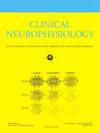缺氧后急性脑损伤中的重复性肌肉沉默期:阴性肌阵挛的新表型
IF 3.7
3区 医学
Q1 CLINICAL NEUROLOGY
引用次数: 0
摘要
方法 我们对三名急性缺氧性脑损伤(PABI)患者的 18 通道视频脑电图和表面脑电图(sEMG)记录进行了回顾性分析。在 1 号和 2 号患者中,出现了全身性的脑电图爆发抑制。在 sEMG 通道中发现了重复的沉默期 (SP),其时间与脑电图脉冲串锁定。猝发分别比静默期早 135 毫秒和 124 毫秒。1 号和 2 号患者的 SP 平均持续时间分别为 910 毫秒和 852 毫秒。3 号患者的背景抑制模式普遍,SP 平均持续时间为 272.5 毫秒。1 号患者的 SP 招募模式为尾状,而 3 号患者的招募模式不固定。肌肉 SPs 可使强直姿势间歇性松弛。推测的发生器可能是皮质或网状结构,类似于兰斯-亚当斯综合征。我们还描述了 EEG 和 sEMG 特征以及假定发生器的定位。本文章由计算机程序翻译,如有差异,请以英文原文为准。
Repetitive muscle silent periods in acute post-anoxic brain injury: A novel phenotype of negative myoclonus
Objective
To report a novel phenotype of negative myoclonus in acute post-anoxic brain injury (PABI).
Methods
We performed a retrospective analysis of 18-channel video-EEG and surface-EMG (sEMG) recordings of three patients with PABI. sEMG electrodes were placed on the neck, bulbar and arm muscles.
Results
All three patients had whole body tonic posturing with intermittent brief relaxation. In patients #1 and #2, a generalized EEG burst-suppression was present. Repetitive silent periods (SPs) were noted in the sEMG channels, time-locked to EEG bursts. The bursts preceded the SPs by 135 ms and 124 ms, respectively. The average SP duration was 910 ms and 852 ms in patients #1 and 2, respectively. Patient #3 had a generalized background suppression pattern and average SP duration of 272.5 ms. The SP recruitment pattern in patient #1 was rostro-caudal whereas patient #3 had a variable recruitment pattern.
Conclusion
Acute post-anoxic negative myoclonus can be detected in comatose patients with sEMG electrodes. The muscle SPs produce intermittent relaxation of the tonic posturing. The putative generator can be cortical or reticular, similar to Lance-Adams syndrome.
Significance
We describe a novel phenotype of negative myoclonus in acute PABI. We also describe the EEG and sEMG characteristics and the localization of the putative generator.
求助全文
通过发布文献求助,成功后即可免费获取论文全文。
去求助
来源期刊

Clinical Neurophysiology
医学-临床神经学
CiteScore
8.70
自引率
6.40%
发文量
932
审稿时长
59 days
期刊介绍:
As of January 1999, The journal Electroencephalography and Clinical Neurophysiology, and its two sections Electromyography and Motor Control and Evoked Potentials have amalgamated to become this journal - Clinical Neurophysiology.
Clinical Neurophysiology is the official journal of the International Federation of Clinical Neurophysiology, the Brazilian Society of Clinical Neurophysiology, the Czech Society of Clinical Neurophysiology, the Italian Clinical Neurophysiology Society and the International Society of Intraoperative Neurophysiology.The journal is dedicated to fostering research and disseminating information on all aspects of both normal and abnormal functioning of the nervous system. The key aim of the publication is to disseminate scholarly reports on the pathophysiology underlying diseases of the central and peripheral nervous system of human patients. Clinical trials that use neurophysiological measures to document change are encouraged, as are manuscripts reporting data on integrated neuroimaging of central nervous function including, but not limited to, functional MRI, MEG, EEG, PET and other neuroimaging modalities.
 求助内容:
求助内容: 应助结果提醒方式:
应助结果提醒方式:


